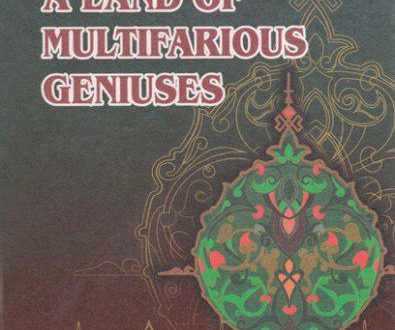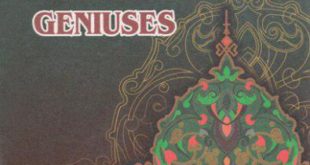About his work “Javami’ al-kalim”
Abu Bakr al-Qaffal ash-Shashi’s book “Javami’ al-kalim” (A Collection of Aphoristic Expressions) occupies a special place in his scientific legacy. “Javami’ al-kalim” belongs to Imam Abu Bakr Muhammad ibn Ali ibn Ismail Qaffal ash-Shashi and it contains a collection of sayings of Prophet Muhammad (saas) which were consolidated in the complexes of commentaries written by Imam al-Bukhari. One of the photocopies of this manuscript containing 32 pages was brought to the library of the Headquarters of the Muslims of Uzbekistan from the library “Zahiriya” in Damascus in 1970 by His Excellency Mufti Ziyavuddin ibn Eshan Babakhan.
The main peculiarities of the book “Javami’ al-kalim” were described by the author Qaffal ash-Shashi in the following lines: “In this book, I have collected more than 1000 expressions uttered by Prophet Muhammad (saas) which I have heard and learned from different original sources. Their construction is free from complexity, their meanings are clear and understandable, and thanks to the support provided by the Prophet (saas), they are on the highest level of maturity. In order to make them easy for understanding, remembering and usage,I divided them into chapters in accord with the closeness of words”. The Hadiths collected in this book were presented in the following order:
Acts depend on the aim.
Advisors are worth believing.
Being kind-hearted is obligatory for everybody.
The Holy Qur’an is a cure for any disease.
Kind wish is a pray.
First greet and then say a word.
A good question is a half of science (knowledge)
Being in the society is a good deed.
Division into small groups is a torture.
As is seen from the above-mentioned text, the Hadiths collected by Qaffal ash-Shashi are short, laconic and full of meanings. The most important thing in it is that they are given in an understandable way. It differs from other collections of Hadiths by the fact that “Javami’ al-kalim” has an educational and didactic character. Besides the rules and laws of Islam, Qaffal ash-Shashi’s book contains aphoristic expressions concerning morality, science, knowledge and education. The proverbs and sayings of aphoristic character used by our people in everyday life also took place in this book which made it easy to spread them among the readers.
Qaffal ash-Shashi had to spend a great amount of labour and endeavour to choose aphoristic words and expressions from the raw collections made before him. It is noteworthy to mention that thanks to his great knowledge,Qaffal ash-Shashi could rely on and demonstrate his ability to create his famous and precious book “Javami* al-kalim”. As a proof to our opinion, we can provide some of the Hadiths included into this book:
“Acts depend on the aim”. We received this information from Abdullah ibn Zubayr al-Hamidi Sufyan. He received it from Yahya ibn Said al-Ansari Muhammad ibn Ibrahim at-Taymi. He heard Alqama ibn Vaqqas al-Laysi Umar ibn Hattab say it from the tribune. From the tribune Umar ibn al-Hattab said that he had heard Prophet Muhammad (saas) mention: “Of course, all the acts depend on the aim. Every man may reach his wish and aim. If someone makes a pilgrimage for the sake of Allah and his Prophet, he will certainly have his blessings that he has earned by his pilgrimage. If someone makes a pilgrimage for the sake of wealth, he will get his wealth; if he wished to make a pilgrimage for the sake of a woman, he will find his woman. Thus he will get everything for the sake of which he makes a pilgrimage”.
This Hadith was a good one and it was borrowed by Imam al-Bukhari from Imam Malik. It was included into several collections of Hadiths as well. Qaffal ash-Shashi borrowed only two phrases from it and these phrases became famous among the people.
“Advisors are worth believing”. This Hadith was borrowed by Abu Muhammad Abdurrahman ibn at-Tajibi from Abu Said | Ahmad ibn Danuqa al-Jamal. He borrowed it from Ibrahim ibn Mahdi, he borrowed it from Hasan ibn Muhammad Abu Muhammad al-Balkhi, he bqrrowed it from Ismail ibn Muslim, he borrowed it from Hasan, he borrowed it from Samura ibn Jundub and Samura ibn Jundub heard Prophet Muhammad (saas) say: “Advisors are not traitors but they are worth believing. So if he wants to give a piece of advice, he does give a piece of advice, if he does not wish to do it, he keeps silence. If he advises someone, he urges him to do the same what he would have done in this very case”. Another Hadith says: “If advisor wishes to give a piece of advice, he does it because he is worth believing, i.e. he can keep the secret of his advice, otherwise he keeps silence, because he is not sure that he can keep the secret”.
Talks depend on the level of keeping their matter in secret. One of the Hadiths says: “If a man having finished his sentence looks alert, it means that his words are a secret for the listener”. According to the teachings of Islam, as the things given to another man to keep safe for some time are secrets, so are his words told him personally so that nobody else could hear them. Betrayal of a word or a sentence said to be kept in secret is equal to the betrayal of a thing given to be kept safe from others.
According to the Hadith borrowed by Abu Muslim Ibrahim ibn Abdullah ibn Muslim, which he borrowed from Abu Asim, which he borrowed from Ibn Jurayj, which he borrowed from Abdulkarim, which he borrowed from the servant of Usman ibn Affan, which he borrowed from Abdullah ibn Ma’qil, which he borrowed from Abdullah ibn Mas’ud, Prophet Muhammad (saas) said: “Feeling sorry for something done incorrectly is a regret”.
“Incorrect and unworthy words bring sorrow”. This Hadith was mentioned by Muhammad ibn Salih ibn Zurayh, which he borrowed from Ismail ibn Musa al-Fizari, which he borrowed from Hushaym, which he borrowed from Mansur, which he borrowed from Hasan, which he borrowed from Abu Bukra where Prophet Muhammad (saas) said: “Incorrect and unworthy words bring sorrow and this sorrow leads to the hell. Shame depend on your belief (faith), your faith leads you to the paradise”.
There is a saying among the Uzbek people “Don’t try to get old, try to get good wish (prayer)”. In his book “Javami’ al-kalim”, Qaffal ash-Shashi presents the Hadith: “Good wish is a prayer”. I his Hadith may be seen in a number of books written by different experts in Hadiths. Of course, it is impossible to comment on all i he Hadiths (more than 1000 in number) presented in Qaffal ash-iliashi’s book “Javami’ al-kalim”. It is important to note that Qaffal ish-Shashi’s above-mentioned book is of great importance for the Islamic sciences and it earned a tremendous fame among the •pccialists in the science of Hadiths because it was written in a nice and understandable language easy to read and absorb its meaning.
In the preface of his book “Javami’ al-kalim”, Qaffal ash-Shashi writes: “I have devoted a special book to the commentaries of Hadiths, so in order to get information about them,you have to address this book”. Thus, it appears that the author had one more book where he gave full information about the merits and flaws of the Hadiths he had collected.
“Javami’ al-kalim” may be rightfully included to the class of books which can rarely be found in the collections of libraries because this book contains the sayings and aphoristic expressions uttered by our Prophet Muhammad (saas). It can easily be understood from its title “Javami’ al-kalim” (A Collection of Aphoristic Expressions) that it contains words and expressions dealing with morality and instructions to follow the rules of behaviour which could be useful for everybody in our daily life despite our religion, faith and nationality.
To make the long story short we can say that Qaffal ash-Shashi is one of our greatest ancestors who visited several foreign countries with the purpose of receiving knowledge, had consultations of the leading specialists of different branches of science, both religious and secular. Therefore, he was estimated with the honourable title in the Islamic world “Hazrati Imam” — “Hastimam”.
Mufti Ziyavuddin ibn Eshan Babakhan honoured Qaffal ash-Shashi in the following lines:’ “Imam al-Qaffal played an important role for the spread of the religious sciences, the Arabic language, the main principles and rules of Muslim law”. Many citations were borrowed in literature by different authors from the works of Imam Qaffal ash-Shashi written in the fields of tafsir, hadith and Muslim law. These scientific acknowledgements denote that Qaffal ash-Shashi was one of the geniuses in the fields of the above-mentioned sciences. A well-known mosque in Tashkent called “Hastimam” is an example of deep respect and honour given to the personality and spirit of the greatest Imam Qaffal ash-Shashi.
 Imom Buxoriy xalqaro ilmiy-tadqiqot markazi bukhari.uz
Imom Buxoriy xalqaro ilmiy-tadqiqot markazi bukhari.uz














